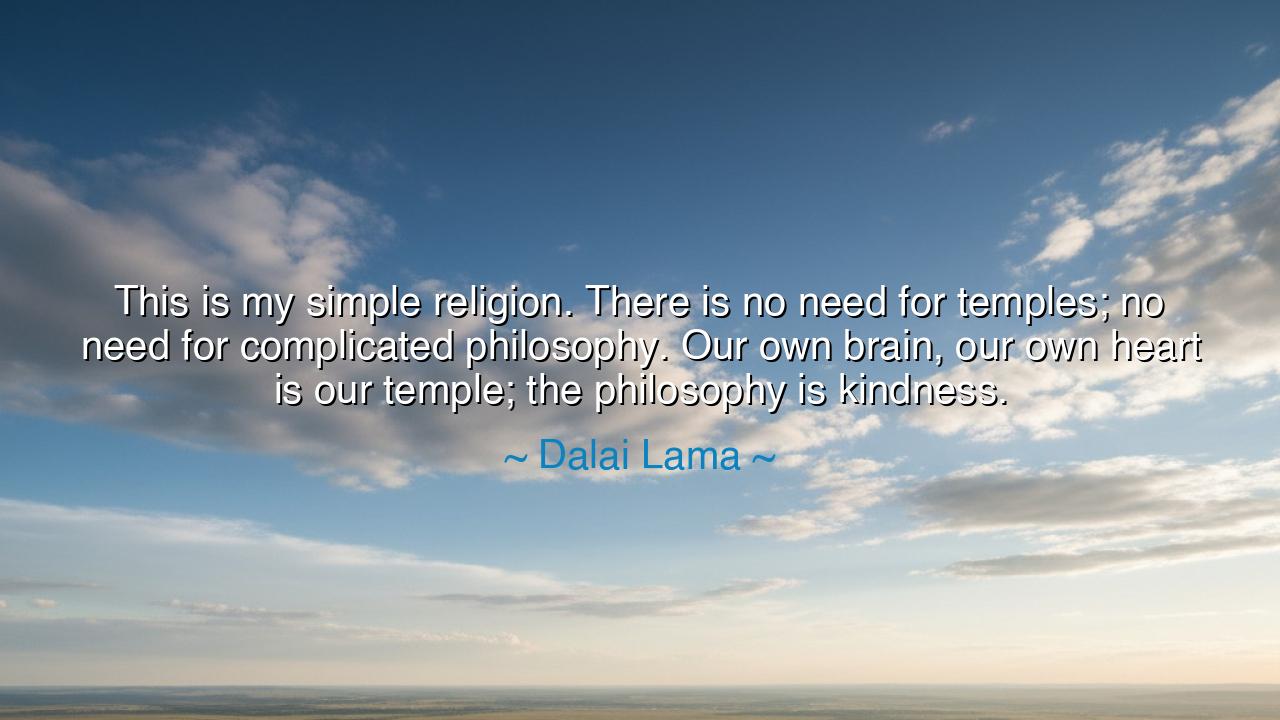
This is my simple religion. There is no need for temples; no need
This is my simple religion. There is no need for temples; no need for complicated philosophy. Our own brain, our own heart is our temple; the philosophy is kindness.






“This is my simple religion. There is no need for temples; no need for complicated philosophy. Our own brain, our own heart is our temple; the philosophy is kindness.” — Thus spoke His Holiness the Dalai Lama, the spiritual teacher and beacon of compassion in our age. In these luminous words, he distills the vast ocean of Buddhist wisdom into a truth so clear and humble that even a child can grasp it. Here, the Dalai Lama reminds us that spirituality is not a matter of form, but of essence. True religion does not depend on rituals, temples, or doctrines — it lives and breathes in the human heart, and its highest expression is kindness.
The origin of this quote lies in the Dalai Lama’s lifelong effort to bridge faith and humanity. As the exiled leader of Tibet, he has witnessed suffering, war, and displacement — yet his message has never been one of vengeance or division. Instead, he teaches that the truest form of religion is the cultivation of compassion, which transcends all boundaries of race, creed, or belief. When he says, “no need for temples,” he does not reject religion; he reclaims its essence. For he knows that temples may crumble, doctrines may fade, but the spirit of kindness is eternal, indestructible, and universal.
In this quote, the temple becomes a symbol — not of stone and prayer wheels, but of consciousness itself. “Our own brain, our own heart is our temple,” he says, reminding us that divinity resides not in places but in people. The mind is the altar of understanding; the heart, the flame of compassion. To enter this temple, one needs no wealth or ritual, only awareness and sincerity. When we think with clarity and act with love, we are already worshipping the sacred within and around us. Thus, every moment — a conversation, a meal, an act of forgiveness — becomes holy ground.
The philosophy of kindness is the golden thread that binds all true religions. Though prophets and sages across centuries have spoken in different tongues, their message is one: love one another, and do good. The Dalai Lama, like Christ and Buddha before him, teaches that compassion is not weakness, but strength — not a sentiment, but a discipline. Kindness requires courage, for it demands that we look beyond ourselves, that we meet anger with patience and hate with understanding. In a world enthralled by power and ambition, kindness becomes an act of quiet rebellion — a way of restoring balance to the soul and peace to the earth.
Consider the story of Mahatma Gandhi, who once said, “My life is my message.” Gandhi, too, had no grand temple, no throne of authority — only a heart rooted in truth and compassion. When faced with violence and oppression, he answered not with hatred, but with forgiveness. His temple was his conscience, and his philosophy was love in action. Through the simplicity of his life — spinning his own clothes, walking among the poor, embracing his enemies — he demonstrated that kindness can move empires and awaken the sleeping conscience of humanity. Like the Dalai Lama, he showed that the greatest spiritual revolution begins not in temples, but in the human heart.
The Dalai Lama’s teaching also warns against the complexity of philosophy that often clouds the essence of truth. He does not dismiss learning or meditation, but he cautions against losing the spirit of love in the labyrinth of words. Too often, people argue about religion while forgetting to live it. They speak of enlightenment, yet cannot forgive a friend; they debate scripture, yet ignore the hungry at their door. But as the Dalai Lama says, “If you want others to be happy, practice compassion. If you want to be happy, practice compassion.” The mind seeks to know, but the heart seeks to heal — and both are sacred instruments of the divine when guided by kindness.
Therefore, dear listener, let this teaching become your compass: your mind is your temple; your kindness is your prayer. You need not travel to holy mountains or memorize sacred texts to live a spiritual life. Every time you choose patience over anger, generosity over greed, or understanding over judgment, you are worshipping in the highest form. Make your thoughts pure, your words gentle, and your actions compassionate — and you will have built a temple wherever you stand.
This, then, is the eternal wisdom of the Dalai Lama — that the essence of all faith is the practice of love. Temples may inspire, philosophies may enlighten, but only kindness transforms. To live kindly is to live divinely; to think kindly is to see clearly; to act kindly is to touch eternity. So let your heart be your altar, your thoughts your incense, and your life your prayer. For in the end, it is not the grandeur of belief that sanctifies the soul, but the quiet, steadfast practice of kindness — the simplest, and therefore the highest, religion of all.






AAdministratorAdministrator
Welcome, honored guests. Please leave a comment, we will respond soon